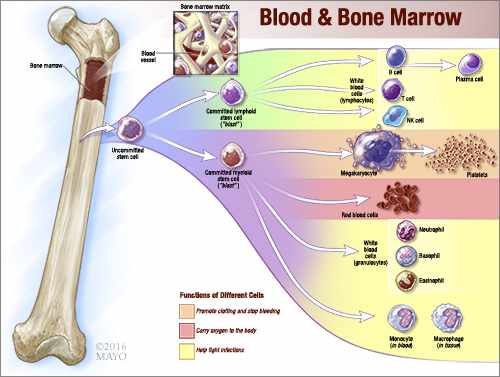-
Featured News
Mayo Clinic Q and A: Bone Marrow Donation Can Save Lives

DEAR MAYO CLINIC: Years ago, after going through infertility testing, my doctor told me someone would love a bone marrow transplant from me because I have an overactive immune system. Why does that make someone a good candidate? I am now 53 and am wondering if I’m too old to donate bone marrow. If not, how do I find out where I can go in my area to become a donor?
ANSWER: Thank you for your interest in becoming a bone marrow donor. Bone marrow donation can save lives, and there’s always a need for people willing to donate. Although age is sometimes a factor, the most important criteria for being a donor is to have the stem cells in your bone marrow match those of the recipient. To be considered as a donor, you can join the registry of potential bone marrow donors that’s maintained by the National Marrow Donor Program.
People who need a bone marrow transplant often have blood disorders or diseases that affect the immune system, such as leukemia, lymphoma or severe anemia. A transplant may be necessary for people with these conditions because their bone marrow may not be able to make enough healthy stem cells, or because bone marrow may not be able to regrow sufficiently following chemotherapy or radiation therapy. A bone marrow transplant can help make the blood cells the body needs, lowering the risk of life-threatening infections, anemia and bleeding.
Although the procedure is called a bone marrow transplant, it's actually the blood-forming stem cells within bone marrow that benefit the transplant recipient. Bone marrow stem cells can develop into red blood cells that carry oxygen to the body, platelets that help blood clot or white blood cells that help fight infection.

It's often best for people in need of bone marrow transplants to receive their own stem cells, if possible. This process usually is safer for the recipient. But in some cases, a person's bone marrow may be too diseased to be used for a transplant. In those situations, it's necessary to use stem cells from a donor instead.
Current research shows that bone marrow donations from people between the ages of 18 and 44 lead to more successful transplants. Because of that, most physicians will select a donor under the age of 45, when possible. However, people are allowed to be donors until the age of 60, and there is particular need for donors from minority populations and those from multiple ethnic or racial backgrounds.
I’m not aware of data supporting the theory that having a history of infertility means you have a stronger immune system and, as a result, would be a better bone marrow donor. In fact, if a potential donor had children, that would make a transplant physician less likely to select that person as a donor. Medical research has shown bone marrow transplant recipients with donors who have had children are at higher risk for a transplant complication called chronic graft versus host disease.
To be considered as a bone marrow donor, visit the National Marrow Donor Program’s website, bethematch.org. There you can learn more and join the bone marrow donor registry. You should note that potential donors between the ages of 45 and 60 are asked to provide payment to cover the cost to join the registry.
Fortunately, the donor’s stem cells repopulate well, so, theoretically, a person could donate more than once. There can be pain after bone marrow donation, but it usually does not interfere with work or school. Peripheral blood donation (blood stem cells collected directly from the blood) requires receiving growth factor drugs and collection on an apheresis machine.
Joining the registry to become a potential bone marrow donor is commendable. As a donor, you have the opportunity to save a person’s life. Although your chances of being chosen are lower due to the reasons outlined above, if you are chosen as a bone marrow donor, you will potentially be someone’s cure. — Dr. Dennis Gastineau, Hematology, Mayo Clinic, Rochester, Minn.







